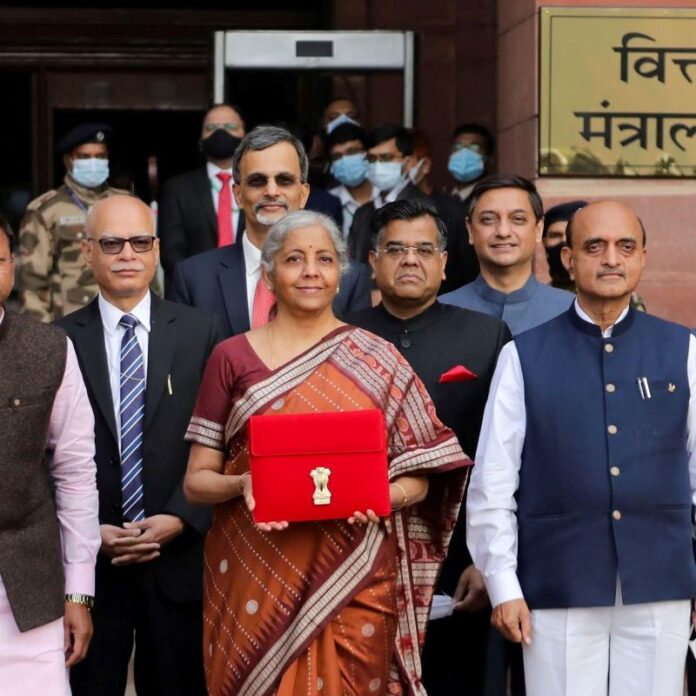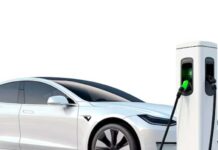
Union Finance Minister Nirmala Sitharaman presented the Union Budget 2023 in the parliament. Here are some Post Budget reactions from the industry leaders:
Mr. Vinod Aggarwal, President, SIAM and MD & CEO, VECV
“33 % increase in capital outlay with an effective provision of Rs 13.7 lakh crores will spur growth in the economy resulting in positive impact on the Auto sector.”
Adding further, he stated, “The Auto industry is fully aligned with the initiatives on Sustainability and Decarbonisation and increased focus on Hydrogen, Ethanol Blending, Bio Gas, Electric Vehicles and Battery Storage.
Announcement for funding various Government Departments for replacement of old vehicles is also commended.
Another appreciable feature of the budget is putting more money in the hands of the individuals by some lowering of effective personal income tax rates that should increase consumption and consequently lead to more demand.
All in all, this is a growth-oriented budget with positive impact on the Auto Sector.”
Mr. Sunjay J Kapur, President, ACMA
The budget is a blueprint of a digitally enabled Aatmanirbhar Bharat, coupled with measures that will drive sustainable yet inclusive growth at a rapid pace.
“Focus on exports, manufacturing, local value addition and encouraging green energy and mobility are indeed steps in the right direction. Further, the proposals for personal Income Tax will put more money in the hands of people thus fuelling consumption, leading to economic growth,” he added.
Mr. Manish Raj Singhania, President, FADA
“The Modi Government’s last full budget has been populist in all aspects as it will help boost Auto Sales all around.
While the capital outlay of Rs 10 Lakh Cr in infra spending will definitely aid CV sales, the aim to scrap all old government vehicles by aiding State Governments will boost all segment sales.
Apart from this, the reduction in individual tax slabs will benefit the ailing entry level 2W and PV segment. Reduction in highest tax surcharge from 37% to 25% will also benefit luxury vehicle sales. With focus on Electrification, relaxation on import duties of Lithium ion batteries will help in price reduction of EVs, thus make it affordable for the masses.
On business front, being part of the MSME universe, cost of credit guarantee will reduce by 1% thus helping Auto Dealers in raising funds. The budget has also focussed on ease of doing business by reducing more then 39K compliances and enabling entity level digilocker for storing and sharing documents.”
Mr. Nirmal K. Minda, Chairman & Managing Director, Uno Minda Ltd.
We welcome the Union Budget 2023 and its larger vision of promoting green growth. The budget focuses on capital expenditure as well as promoting consumption. It also offers steps to boost domestic manufacturing and encourage green energy, and mobility. The announcement of INR 35,000 crore fund to support green projects will give a massive boost towards India’s net zero goals. Additionally, the Green credit programme, will further encourage responsible companies to take more environmentally sustainable and responsible actions. All these steps are also going increase the jobs in these sectors.
We are particularly encouraged by the push that the budget is likely to give to the auto sector in the form of Vehicle Replacement policy which will allow States in replacing old polluting vehicles. This will in turn benefit auto sales and electric vehicles. We look forward to understanding the FM’s proposal to reduce basic customs duty on some goods from 21 per cent to 13 per cent, including lithium and ion cell batteries used in EVs. Overall, this is an inclusive budget that also stands to further boost Atmanirbhar vision.
Mr. Satyakam Arya, Managing Director & CEO, Daimler India Commercial
“The FY 2023-24 Union Budget shows consistency and an intent for growth. The 33% increase in CAPEX outlay underlines the fact that the Budget is pro-growth and the increase is to step up on the 7% growth achieved in the previous fiscal. Main highlights which stood out for us as a commercial vehicles manufacturer was the eye on digitalization by leveraging 5G, which can help optimize costs and improve efficiency in the sectors it is implemented; the INR 19,500 crore outlay for green hydrogen development is a step in the right direction for the future of heavy-duty trucks and largely, the logistics industry; INR 35,000 crore for renewable energy transition projects is also an interesting initiative but how this pans out in the medium term will mark its significance; the PM Awas Yojana that is planned for boosting rural housing would create more jobs and bring more projects for the CV industry. We also feel that the concept of the Green Credit program can be beneficial if thought through and implemented well. Our overall view of the FY 2024 budget is that it is expansive and pragmatic. The budget clearly indicates a penchant for sustainable growth with a potential of aligning with long-term objectives. While the infrastructure push is a fiscal multiplier, it also gives the CV industry plenty of projects to look out for in the medium term. However, we were also expecting more on the National Logistics Policy, its strategy which was drafted exceptionally and we were eager to see it get implemented or at least have an outlay. A more specific mention on the continuity of the Scrappage Policy would have given a direction to the industry, not just for preparing to replace phased out vehicles with new ones but to encourage the proliferation of scrappage companies to expand their businesses.
There is no doubt that India’s economy is more resilient and can withstand headwinds coming from slowing global economies but execution of direction is important to set the country on the path to achieve more success. India is also a great opportunity for global investors to consider investing in our country, to enjoy the long term benefits of an economy that is getting stronger by the year. The FY 2023-24 Budget shows consistency but the near-term capital inflow is worth monitoring and improvising on in order to transform consistency into healthy momentum.”
Mr. Dheeraj Hinduja, Executive Chairman, Ashok Leyland:
“Union Budget 2023-24 is aligned with the Prime Minister’s vision of building a competitive and resilient India, with inclusive growth. The budget emphasises comprehensive national infrastructure development and expands on the digitization of the economy. The road transportation sector plays an important role in national development and would have an even more impactful role, going forward, in supporting the Government’s vision. The announcement that old vehicles owned by the central government and state governments will be replaced as part of the vehicle scrapping policy presents a significant opportunity for fleet modernisation. This budget also echoes our sentiment and commitment to clean energy vehicles for a cleaner and greener future, as part of a national mission to achieve the net zero carbon emission goal.”
Mr. Shenu Agarwal, MD & CEO, Ashok Leyland:
“The Finance Minister has presented a Budget for 2023-24 that is pro-growth and pro-development, with a focus on sustainable development, energy transition for a cleaner tomorrow, and inclusive growth through a tech-enabled economy. The budget further reinforces our nation’s ambition to make India “Atmanirbhar.” The entire budget for this year addresses a wide range of topics to support the economy, including health, education, infrastructure, and agriculture.”
Mr. Vikram Gulati, Country Head and Executive Vice-President, Toyota Kirloskar Motor.
“The Hon’ble Finance Minister Smt. Nirmala Sitharaman has presented an exceptional budget by balancing the need for sustaining rapid growth, while maintaining an eye on fiscal prudence. Given the fact that there is an outlay of Rs. 10 trillion towards Capex which represents 3.3% of the GDP, and a 33% Y-o-Y increase, this will definitely contribute to a robust economic growth. While doing so, the Government has aimed at a fiscal deficit target of 5.9% for the upcoming year with a clear glide path to bring the fiscal deficit below 4.5 per cent of GDP by 2025-26.
The Budget which not only focuses on inclusiveness, youth empowerment and skill development, but also aims to give impetus to “Green Growth” with sufficient outlays for supporting the recently announced National Green Hydrogen Mission, doubling of allocation for FAME 2 scheme and for providing viability gap funding for Battery Energy Storage System (BESS). The support for 500 new “WASTE to WEALTH” plants under the GOBARdhan scheme towards leveraging compressed biogas will also encourage a Green and circular economy.
Further, the announcement towards fund allocation for scrapping old vehicles of Central and State Governments will not only help the environment and reduce fossil fuel consumption, but will also generate demand for new vehicles.
Priorities of this year’s budget clearly resonates the Government’s vision for overall development of our country in an inclusive, environmentally responsible manner towards a technology driven and knowledge based economy . The added reforms announced towards the ease of doing business, as well as simplifying the direct tax administration, as well as introducing new tax slabs, are bound to lead to greater disposable income, which will generate demand and are supportive for the growth of the economy.”
Mr. Chetan Maini, Co-founder & Chairman, SUN Mobility.
“I applaud the government’s continued efforts to accelerate the country’s transition to sustainable development and green growth, focusing on green fuels, energy, building practices and creating new “green” jobs besides leading to reduced carbon intensity. The announcement of ₹35,000 crore budget for green transition allocation and the proposal of zero carbon emission goal by 2070 are huge steps forward in promoting India’s progression towards green growth. However, the industry looks forward to the government to share more insights about the capex allocation to support the commercial vehicle sector as part of the green growth agenda.
It is also encouraging to see the government’s decision to announce viability gap funding for battery storage solutions and continuation of lower customs duty on lithium-ion cells. The scrappage of old government vehicles and budgetary allocation towards the same, is a positive step in the direction of zero carbon emission goal.
While this budget is impactful, I feel that release of the Battery Swapping Policy covering subsidies and GST rate rationalization from 18% to 5% on EV battery would have added further to the green growth agenda.”
Mr. Nagesh Basavanhalli, Executive Vice Chairman, Greaves Cotton Ltd.
“We are pleased to see ‘Green Growth’ as one of the mission critical objectives laid out in Union Budget 2023. As India transitions towards sustainable mobility, there needs to be a strong impetus on building the sustainable mobility ecosystem with clean technologies. This will require upskilling the existing human resources to green technologies. From using clean power in component and vehicle manufacturing to charging of vehicles to battery repurposing and recycling, there is a great opportunity to building requisite clean tech infrastructure for EV’s. The investments in ‘Made in India’ EV components, besides product and innovations with give us better control of the entire carbon chain.
The outlay of Rs 35,500 crores in energy transition will play a key role in accelerated transition towards an all-electric ecosystem. The mobility is sector poised to emerge as one of the prime drivers of net zero emissions. Greaves is one of the dominant players in building the EV ecosystem in India and we are strongly aligned to the ‘Green Growth’ efforts. The country’s journey towards decarbonization gets further momentum with National Green Hydrogen Mission, as the Rs 19,700 crore capital outlay will reduce dependency on fossil fuels and encourage more innovations in use cases of clean energy and renewables.
Finally, the Union Budget 2023 paves the way for a favourable, positive and stable macro-economic environment with economic growth pegged at a robust 7%, doubling of per capita income, positive tax reinforcements for the salaried class, and capex allocation of 10 lakh crore. This will stimulate the economy, revive consumer sentiments, and help boost purchasing power.”
Mr. Ankit Kedia, Founder & Lead Investor, Capital A
We welcome the Union Budget 2023-2024’s strong emphasis on green growth and sustainability. This budget will be used to encourage investments in renewable energy sources, reduce carbon emissions, and increase energy efficiency. One of the key aspects of this is the launch of a Rs 2,200 crore Aatmanirbhar clean plan program. This is a clear indication of the government’s commitment to reducing India’s estimated total carbon emissions by 1 billion tonnes by the end of the decade. The government’s aspirations to achieve net-zero carbon emissions by 2070 and reduce the country’s carbon intensity by 45% by 2030 are also significant steps in this direction. The government plans to develop an integrated sustainable development system that includes measures such as electric vehicles, waste management systems, water conservation projects, and solar power plants. Furthermore, the budget also promises increased funding for research and development of clean technology solutions including green hydrogen production facilities. The government’s decision to exempt excise duty on GST-paid compressed biogas containment will give a boost to the green mobility sector. Also, custom duty exemption on the import of lithium-ion batteries will continue to focus on the transition to electric mobility. Overall this Budget will help India achieve its commitment to a low-carbon economy while achieving economic growth at the same time. It is expected that these initiatives will help create employment opportunities as well as attract foreign investment into India’s economy.
Mr. Uday Narang, Founder and Chairman, Omega Seiki Mobility
“The government’s forward looking vision in promoting environment and sustainability in the recent Union Budget 2023, will prove to be an accelerator for the EV Industry. Extension of customs duty exemption for the manufacture of lithium-ion batteries and removal of customs duty on imported machinery used for manufacturing Li-ion batteries are welcome initiatives as these will help in boosting the demand for EV’s.
The policy on the replacement of old polluting vehicles should accelerate the transition towards electric vehicles. Overall, we are happy with the budget as it is inclusive, and progressive and will encourage investments in the EV sector in a big way.”
Mr.Tushar Choudhary, Founder & CEO, Motovolt Mobility
The Union Budget for 2023-2024 has a strong focus on green growth and sustainability. The “Green Growth” priority sector is a step towards India’s resolve to achieve Net Zero by 2070. The government has granted infrastructure status to the EV sector, paving the way for easier access to credit for companies making EV components. This will reduce production costs and help expand India’s manufacturing capabilities in this sector. The scheme announced to scrap old vehicles and replace the old polluting vehicles will encourage more people to switch over from petrol/diesel cars to electric ones. The Indian Government is committed towards introducing green mobility solutions such as e-rickshaws, e-bicycles and other clean energy transport systems in cities across the country with an emphasis on green growth with focus green fuel. We are delighted to see such initiatives included in the Union Budget 2023.
Mr. Varun Goenka, CEO & Co- Founder, Chargeup
The emphasis on green growth and net-zero emissions is the need of the hour as outlined in the Union Budget. The outlay of 35,000 crore for priority capital investments towards energy transition and net-zero goals will boost energy security in India. Further, the decision to support Battery Energy Storage Systems with a capacity of 4,000 MWH with viability gap funding will give a huge impetus to the clean energy sector. One of the most impactful decisions this time is the extension of customs duty exemption for import of capital goods and machinery required to produce lithium-ion batteries for EVs in India. This move will reduce the initial capital investment needs for the battery manufacturers and is also likely to make the batteries become cheaper as there will be a larger manufacturing base for them. Concession on duty on lithium ion cells import for EV batteries has also been extended for another year, which would lead to greater EV adoption in 2023. Similarly, basic customs duty exemption on raw materials required for manufacturing of nickel cathode used in the batteries has also been continued. Improving the ease of doing business by reducing 39,000 compliances, and the decision to provide greater funding to state governments to replace old polluting vehicles are also welcome steps. It is expected that these old vehicles will be replaced with EVs and that would improve their adoption in the country. The establishment of 100 National Skill Development Centers will ensure that a larger number of youth across India are trained on advanced technologies and made ready to work in the climate-tech sector. All these are great initiatives, and if this momentum is further supported by the unveiling of the final draft for the Battery Swapping Policy, we will be able to witness accelerated growth of clean mobility in India.
Mr. Abhijit Bhattacharya, Founder & CBO, Ongreen
The Union budget has sent the right signal to investors, businesses, and citizens that green growth is a priority for India. At OneGreen, we are extremely thrilled with the government’s focus on the environment and ensuring that people switch to a more sustainable way of life for without this, the health and wellness of the nation in its truest sense can never be achieved. We are encouraged by the focus on sustainable agriculture practices, including organic farming initiatives backed with incentives for over 1 crore farmers which will help ensure that chemical-free food ingredients are used in food and related products. The Green Credit Programme under the Environment (Protection) Act to incentivize environmentally sustainable and responsive actions by companies, individuals and local bodies will help each and every one of us inculcate sustainable habits and increase investments in the sector. We also welcome the government’s move to increase its expenditure on building sources of renewable energy. Further tax exemptions such as the reduction of GST rates on electric vehicle components and waivers or subsidies given out to households using renewable energy systems will contribute greatly towards creating an environment-friendly infrastructure in India. Indians in the post-pandemic era have understood the importance of living a green and clean life and this budget with its focus on behavior change will steer the population in the right direction. We look forward to seeing how this budget shapes India’s future trajectory toward sustainable development goals!
Mr. Suhas Rajkumar, Founder and CEO, Simple Energy.
“The budget for FY24 announced by FM Nirmala Sitharaman is encouraging on a lot of fronts, especially in the space we operate in. One of the key focus areas is Green Growth and the schemes announced are promising and we welcome the optimism ignited by the Finance Ministry in this space.
These progressive schemes will surely enable rapid electrification in the country and encourage consumers to transition seamlessly towards green mobility which will help OEMs to script a robust growth story in the domestic market. Furthermore, we congratulate the Government of India on laying down its aim of reaching net-zero carbon emissions by 2070. We will work in alignment with the GoI’s aim to maximize growth opportunities in shaping a greener tomorrow.”
Mr. Sameer Aggarwal, CEO and Founder of Revfin Services
“The government’s dedication to ‘green growth’ approach promoting environmental sustainability, as emphasized by Finance Minister Nirmala Sitharaman in the recent Union Budget 2023, is a commendable development,” stated Sameer Aggarwal, CEO and Founder of Revfin Services, an electric vehicles financing & digital lending platform. He added, “The emphasis on reducing carbon footprint and generating employment through green growth initiatives displays a deep comprehension of the interdependence of the environment and the economy. The 7 main priorities, referred to as ‘Saptrishi,’ will drive sustainable and environmentally friendly economic development and this, truly is in the direction of India seeking a leadership role in mitigating the global climate crisis.”
Commenting on the inclusive aspect of the announcements made, Sameer said, “Budget is very positive for rural economy as it is talking about investments and credit schemes in agriculture, fishery, cattle etc. and this will generate higher income for rural folks and enable them to purchase L5 (e-rickshaw for commercial purposes) and better capacity to repay EMIs. Customs duty exemption is being extended to imports of capital goods and machinery required for the manufacture of lithium-ion cells for batteries used in electric vehicles to further boost green mobility.”
Mr. Himanshu Singh Raghuvanshi, Co-Founder & COO, CapGrid
The budget is very thoughtful driven by market dynamics. Lots of positives coming out on the green energy front. Welcome the decision of extension of subsidies on EV batteries. Scheme to support state governments and municipalities in replacing their old polluting vehicles will also give sales push to the automotive & EV segment. With cost of capital expected to remain high, glad that the current liquidity scenario in the markets have been paid heed to with Credit Guarantee Scheme for MSMEs extended with an infusion of Rs 9000 crore. This will help the entire auto sector which is held together by MSMEs.
Mr. Siddhartha Bagri, CEO, Pravaig Dynamics.
“The Hon. FM balances between ground reality and future global scale opportunities extremely well. Safeguarding India’s markets, while ascertaining access to international capital and equipment is akin to the crouching of a bengal tiger right before a full stride. Pravaig straddles 3 challenging & high tech industries, I.e. automotive, energy, & defense, and we are more confident than ever. Starting and scaling is getting better each day under this Government.”
Mr. Niranjan Nayak, MD, Delta Electronics India
We are firmly aligned with the Government’s vision of ‘Amrit Kaal’ which includes a technology-driven, knowledge-based sustainable economy. For the vision of 2070 Net-Zero CO2 Emission, investment in the energy transition will play a crucial role. We at Delta have already implemented many programs for reducing carbon emissions and signed up for many sustainable initiatives like RE100, net zero, green products etc. for a greener tomorrow. Also, all our products offerings are energy-efficient and green solutions that aid in achieving the overall nation’s carbon footprint reduction targets ranging from power quality improvement products to green EV charging solutions etc.
The Budget 2023 further focus on sectors that include setting up labs for developing applications using 5G services, railways and enhanced focus on the smart city infrastructure to keep the economy on a steady growth, these are progressive measures and we feel that they will play a critical role for us to become key contributors in these areas and further development. The budget has particularly emphasized on efficiency and sustainability as the key driving forces in the coming years and let all key stakeholders identify and utilise these opportunities to drive the robust growth agenda of the country.
Mr. Anil Kumar M R, President and Managing Director, SEG Automotive India Private Limited:
We welcome the budget announced by GOI yesterday. The focus on inclusive growth driven by infrastructure investments, youth power and focusing on the financial sector should support the Indian economy to continue to grow stronger. The announcements related to “GREEN GROWTH” focusing on green fuel, green buildings and efficient use of energy will support in reducing carbon footprint and reaching the goal of carbon neutrality by 2070. We welcome the scheme of scrapping old polluting vehicles meeting the target of carbon neutrality and new demand generation. Exemption of customs duty on Li-Ion batteries is a great move to increase EV penetration and reduce TCO. The capex allocation to the commercial sector is a good sign for the recovery of the CV sector. In this budget, we could see a lot of focus on the hydrogen mission and planned budget outlay coupled with enhanced annual capacity.
Mr. Sumit Garg, Co-founder and MD of Luxury Ride
“The much-awaited anticipation around the Union Budget has come to an end. The policies chalked out for the automobile industry incurring increased duty rate is very unlikely to have any impact on the entry-level luxury vehicle segment. The condition of levying duty on engines with more than 3000cc petrol capacity will have a nullifying effect on the luxury cars as there are meagrely any cars in India exceeding the 3000cc capacity. Furthermore, the vehicle scrapping policy is an appreciative step on the part of the government. It comes as a silver lining that not just serves the novel cause of ushering towards a greener planet but at the same time, it will give an impetus to the surging demand for cars.”
Mr. Kunal Chandra – Co-Founder of Astro Motors
” We are pleased to see the Government’s continuing efforts to stay committed to green energy initiatives, making it one of the key points in this budget. The reduction of duties on lithium-ion cells from 21 percent to 13 percent will further boost the domestic manufacturing in India and make it cheaper for Indian consumers to own electric vehicles. The Monterey support in these growth sectors will definitely increase the adoption of electric vehicles at a faster pace and help us on our journey to achieve carbon neutrality”
Mr. Lalit Singh- Chief Growth Officer- TelioEV
“Excited to see the budget’s focus on green growth and the pro-EV initiatives, particularly the reduction of customs duties on lithium batteries and extension of subsidies for EV batteries. These actions will drive demand for electric vehicles and align with the budget’s goal of promoting eco-conscious lifestyles. The policy to replace old, polluting vehicles will further accelerate the transition to EVs. Overall, a well-rounded, progressive budget that will encourage investments in the EV sector.”
Mr. Ketan Mehta, CEO and Founder of HOP Electric Mobility
India’s fastest growing electric 2-wheeler manufacturer, says “A largely all-encompassing inclusive budget offers something to cheer about for all sectors; emphasis on rural development – where resides the real BHARAT, and Green sustainable climate consciousness is growth focused for a bright future. The Budget will drive economic growth, create jobs and attract investments. Pushing investments in sectors such as agriculture, fishery and cattle, and supporting procurement of components for electric vehicles, and focus on clean energy and fuels like Hydrogen will significantly enhance the prospects of segments that were in need of attention.“
Mr. Stefano Sanchini Managing Director, Bridgestone India
“The Government’s proposal to increase the capital expenditure outlay by 33% is a welcome move as this will directly impact the logistics and mobility sectors. These sectors would also grow as they expand to serve the enhanced demand for goods generated by new infrastructure projects. The Finance Minister’s statement on replacing old government vehicles will increase the demand for new vehicles and we are committed to supporting the OEMs meet this demand.”
Mr. Saurav Ghosh, Co-founder, Jiraaf
Union Budget 2023 is very promising for the financial sector and carves out an excellent path for the future with a focus on growing the MSME sector, pushing infrastructure development, and enabling personal consumption. Extension of the ECLGS scheme along with other measures would have a huge impact on promoting growth. The finance minister has taken substantial steps to reduce credit costs for the sector which would help in promoting employment and growth. Boost MSMEs through easier credit would aid growth, ease tax liability, and promote consumption. Focus on reducing credit costs would also boost profitability and help create more jobs. Additionally, increased expenditure on infrastructure and personal tax reforms would aid create a positive sentiment in the economy and put India on a path for rapid development.
Mr. Ankit Kedia, Founder & Lead Investor, Capital A
The Indian venture capital (VC) community hoped that the Union Budget 2023-2024 would lay down a clear roadmap for the development of India’s startup ecosystem. We are happy to see policies and initiatives aimed at facilitating access to capital, creating an enabling environment for innovation and entrepreneurship, promoting digital infrastructure, enhancing business growth opportunities, and providing tax benefits. The Government has aptly identified the need to ramp up skill development and upskilling among youth to make them job ready for the future. Announcements such as the setting up of 3 AI Centres of Excellence to train youth on AI applications, and the decision to set up a unified Skill India Digital platform with a focus on Coding, AI, IoT, and Robotics related skills is going to be the game changer for tech landscape of the country, especially verticalized SaaS (Software as a Service) startups Indian SaaS and technology sectors.
Another step that will benefit the startups is the emphasis on agriculture-based startups through the setting up of an Accelerator Fund for agri-tech startups. The Government has also taken steps like reducing 39000 compliances and de-criminalizing 3400+ legal provisions which will boost the confidence of startup founders. Further, offering relief for up to ten years to startups in carrying forward and setting off losses will make them more sustainable.
What we had also expected was the announcement of some GST benefits and tax benefits to investors which would have enhanced liquidity in the capital market. However, those steps haven’t been focused on, and we hope the Government makes those changes in the months ahead as having adequate liquidity and access to domestic investments is going to be crucial for the startups in a year that is likely to be hit by a global recession.
Dr. Aravind Chinchure CEO, Deshpande Startups
The Government’s plan to undertake countrywide skill development and building of facilities to support rural entrepreneurship is a much-needed step. For instance, the plan to set up one hundred labs to develop applications using 5G services within engineering institutions to cover a wide range of business opportunities, models and generation of employment is in line with the vision of Deshpande Startups. The planned labs are going to have smart classrooms, and the focus will be on creating solutions for precision farming, intelligent transportation and healthcare applications. Deshpande Startups has already established end-to-end startup incubators that provide all the necessary inputs to the student entrepreneurs in engineering colleges as well as the first-time startup founders. We hope that the government’s plans to undertake startup incubation, skill development through physical centers and digital platforms and to support startups through measures such as ease of doing business, simplification of taxes and usage of AI, IoT and Robotics are effectively implemented. The proposed public-private partnership model can lead to faster access to knowledge, technology and capital for the startup founders and we look forward to contributing to it. We also welcome the Agriculture Accelerator Fund to encourage agri-startups by young entrepreneurs in rural areas. A lot of our startups stand to benefit from this initiative, of which most of them are Agri Startups. We have constantly been trying to build infrastructures as in setting up primary units, secondary processing units and innovation centres, to add value to the production of farmers as a part of different clusters models. Hence the inclusion of agri benefits in the Union Budget is aligned with our cluster models and agricultural initiatives. We also believe that the National Data Governance Policy aimed at unleashing innovation and research by start-ups and academia will go a long way in promoting entrepreneurship nationwide.
Mr. Pratik Kamdar, Co-Founder Neuron Energy
“The Government’s fidelity to reduce carbon footprint in the country has been re-assuring in the Union Budget 2023. The push towards green mobility will propel the growth of the EV sector in India and will encourage further investments. To usher in a green industrial and economic transition, India is committed to achieving net-zero carbon emissions by 2070. With its focus on green growth and push for green mobility, this budget provides the much-needed impetus to the sector. The Customs Duty exemption on capital goods and machinery to manufacture li-ion will be a facilitator for the country to transition to sustainable and eco-friendly mobility. The exemption will have a domino effect on the overall sector with the over substantial decrease in the overall cost of the finished products wherein the battery packs are likely to reduce by 5% coupled with lower initial investments. Additionally, the vehicle scrapping policy will also be beneficial if the old vehicles are replaced by electric vehicles. This will further aid in the country’s vision of mass EV adoption by 2030. The sector also holds immense potential with regards to providing entrepreneurship opportunities and job creation. With decreased capital investments to manufacture ancillary supplies like li-ion batteries, it will provide a platform for new age businesses and entrepreneurs to venture into the space. Overall, we are confident that this Budget will aid in the country’s adoption to electric mobility significantly.”
Mr. Arun Sreyas, CEO & Co-Founder, RACEnergy
“We at RACE, design and manufacture our batteries in-house and are delighted to see the government’s proposal to exempt customs duty on the import of capital goods and machinery required for the production of lithium-ion batteries. This move will fuel the development of the country’s EV sector, allowing for the establishment of battery production facilities within India and, in turn, contributing to sustainable mobility.
We have integrated deep-technology at RACE in our swap stations, which store excess energy and provide it to consumers during peak demand hours. This optimises energy utilisation and, when coupled with the government’s proposed initiative to increase capital investment towards energy transition and energy security, could help increase the adoption of sustainable mobility solutions.”
Mr. Avinash Sharma, CEO & Co-Founder, ElectricPe
“One of our primary goals at ElectricPe is to increase the adoption of e-mobility in India, thereby reducing pollution and lowering carbon emission levels. We are elated that the government has declared a target of zero carbon emissions by 2070.
The Green credit program that will incentivise companies, individuals, and local bodies to use sustainable methods will have a positive impact not only in the EV sector but across various sectors, thereby helping the nation move towards a greener and circular economy.
The step to allocate higher funds for investment in energy transition, energy security, and net zero objectives will strengthen the electric vehicle sector in India, creating more opportunities for OEMs and infrastructure players to build a stronger industry.”
Mr. Ravi Neeladri, CEO, Cerebra Green
“We are glad that one of the key pillars of focus for the government, in the Budget 2023 has been ‘Green Growth’ and a vision to achieve zero carbon emission by 2070. The move to introduce a Green Credit program, which will be notified under the Environment Protection Act, will definitely be a game-changer in encouraging not only corporate organisations but individuals as well to adopt sustainable practices, including E-waste recycling and refurbishing. Hopefully, the new policy to replace old pollution-causing vehicles will pave way for the formal recycling and efficient waste management of automobile parts thereby leading to job creation.”
Mr. Ranjita Ravi, Co-Founder of Orxa Energies
“We are quite happy to see the government’s transition towards ‘Green Growth’. The custom duty exemptions on lithium-ion batteries in particular are quite encouraging for manufacturers. This will bring more small and medium players to the forefront with the resulting reduction in costs and stronger supply chains. Budget 2023 clearly seems to be a strong step towards a less carbon-intense economy.”









